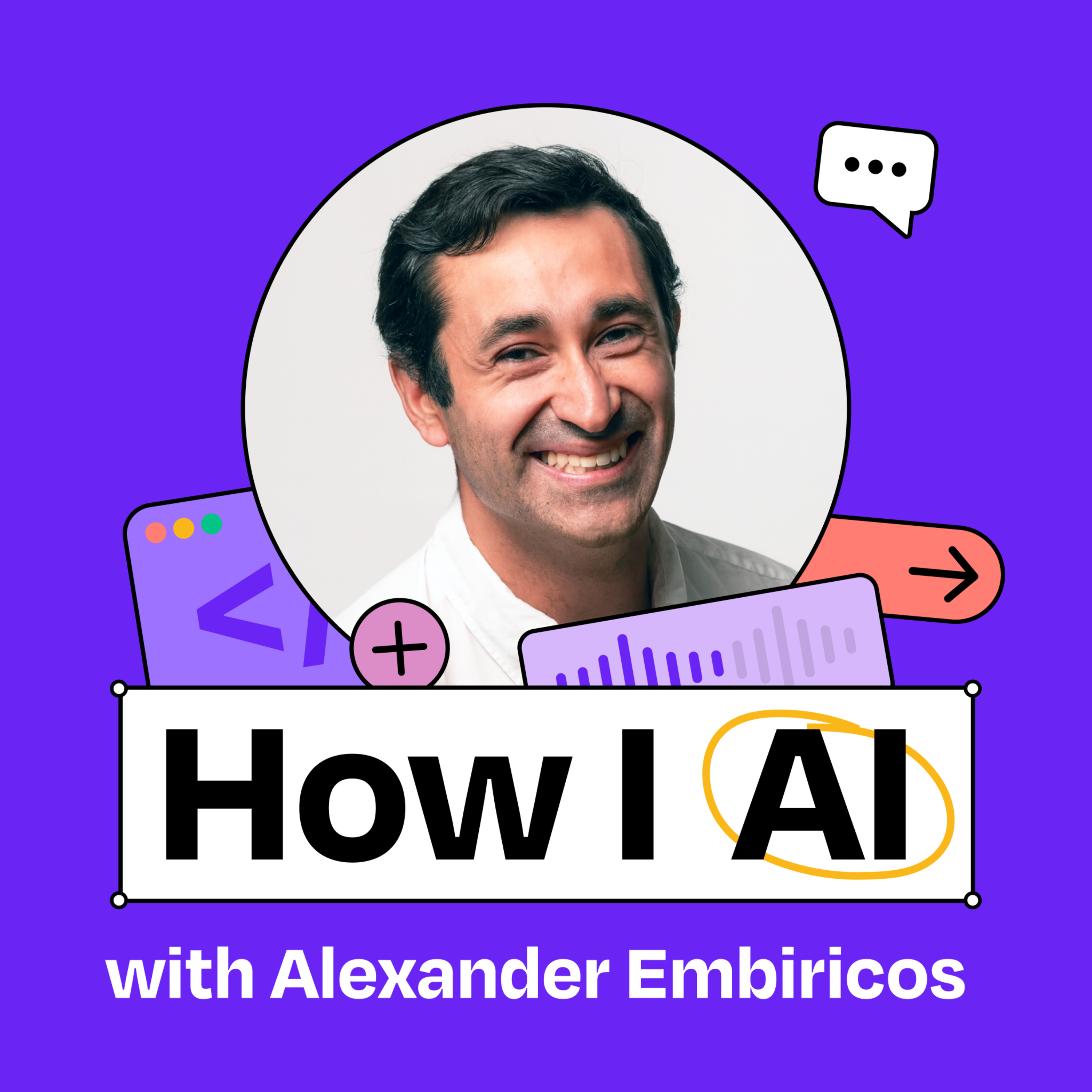How I AI

How I AI
Podcast Description
How I AI, hosted by Claire Vo, is for anyone struggling to keep up with the latest AI news, and wondering how to actually use these magical new tools to improve the quality and efficiency of their work. In each episode, guests will demonstrate a specific, practical, and impactful way they’ve learned to use AI in their life. Expect 30-minute episodes, live demos, and tips/tricks/workflows you can implement immediately. If you want to demystify AI and learn the skills you need to thrive in this new world, this podcast is for you.
Podcast Insights
Content Themes
This podcast focuses on practical applications of AI across various domains with specific episode themes such as increasing team productivity, utilizing AI in product design, and enhancing workflows with automation. An example includes the episode featuring Sahil Lavingia, CEO of Gumroad, discussing how his team uses AI agents to significantly boost coding efficiency.

How I AI, hosted by Claire Vo, is for anyone wondering how to actually use these magical new tools to improve the quality and efficiency of their work. In each episode, guests will share a specific, practical, and impactful way they’ve learned to use AI in their work or life. Expect 30-minute episodes, live screen sharing, and tips/tricks/workflows you can copy immediately. If you want to demystify AI and learn the skills you need to thrive in this new world, this podcast is for you.
Alexander Embiricos, the product lead for Codex at OpenAI, shares practical workflows for getting the most out of this AI coding agent. In this episode, he demonstrates how both non-technical users and experienced engineers can leverage Codex to accelerate development, from making simple code changes to building production-ready applications. Alex walks through real examples of using Codex in VS Code and terminal environments, implementing parallel workflows with Git worktrees, and creating detailed implementation plans for complex projects. He also reveals how OpenAI uses Codex internally, including how they built the Sora Android app in just 28 days, and offers insights on automated code review and the future of AI-assisted development.
What you’ll learn:
- How to set up and use Codex in VS Code and terminal environments for both simple and complex coding tasks
- A practical workflow for running multiple Codex instances in parallel using Git worktrees to avoid conflicts
- How to create detailed implementation plans using the Plans.md technique for complex engineering projects
- Why context is critical when prompting Codex—and how to provide the right information for better results
- How OpenAI uses automated code review to accelerate development while maintaining high quality standards
- The key differences between vibe coding for prototypes versus building production-ready applications with AI
- How the new GPT-5.2 model improves Codex’s capabilities with faster reasoning and better problem-solving
—
Brought to you by:
Brex—The intelligent finance platform built for founders
Graphite—Your AI code review platform
—
Detailed workflow walkthrough from this episode:
https://chatprd.ai/how-i-ai/advanced-codex-workflows-with-openai-alex-embiricos
—
In this episode, we cover:
(00:00) Introduction to Alex and Codex
(02:06) Getting started with Codex
(04:54) Using Codex for parallel tasks
(07:34) Understanding Git worktrees
(09:51) Terminal shortcuts and command-line efficiency
(12:16) How OpenAI built the Sora Android app with Codex
(15:37) Using PLANS.md for problem solving
(17:57) The importance of high agency
(22:22) Deciding between what needs a plan and what doesn’t
(26:42) How to multiply the impact of Codex
(28:08) Implementing automated code review with GitHub
(31:58) Delivering the benefits of AGI to all humanity
(34:35) Accelerating developer productivity
(36:38) Recap and final thoughts
—
Tools referenced:
• Codex: https://openai.com/blog/openai-codex
• VS Code: https://code.visualstudio.com/
• Cursor: https://cursor.com/
• Git: https://git-scm.com/
• GitHub: https://github.com/
• Atlas: https://openai.com/atlas
• ChatGPT: https://chat.openai.com/
• Slack: https://slack.com/
• Linear: https://linear.app/
—
Other references:
• Sora Android app: https://openai.com/blog/sora
• GPT-5.2 model: https://openai.com/index/introducing-gpt-5-2/
• SWE-bench: https://openai.com/index/introducing-swe-bench-verified/
—
Where to find Alexander Embiricos:
LinkedIn: https://www.linkedin.com/in/embirico
—
Where to find Claire Vo:
ChatPRD: https://www.chatprd.ai/
Website: https://clairevo.com/
LinkedIn: https://www.linkedin.com/in/clairevo/
—
Production and marketing by https://penname.co/. For inquiries about sponsoring the podcast, email [email protected].

Disclaimer
This podcast’s information is provided for general reference and was obtained from publicly accessible sources. The Podcast Collaborative neither produces nor verifies the content, accuracy, or suitability of this podcast. Views and opinions belong solely to the podcast creators and guests.
For a complete disclaimer, please see our Full Disclaimer on the archive page. The Podcast Collaborative bears no responsibility for the podcast’s themes, language, or overall content. Listener discretion is advised. Read our Terms of Use and Privacy Policy for more details.